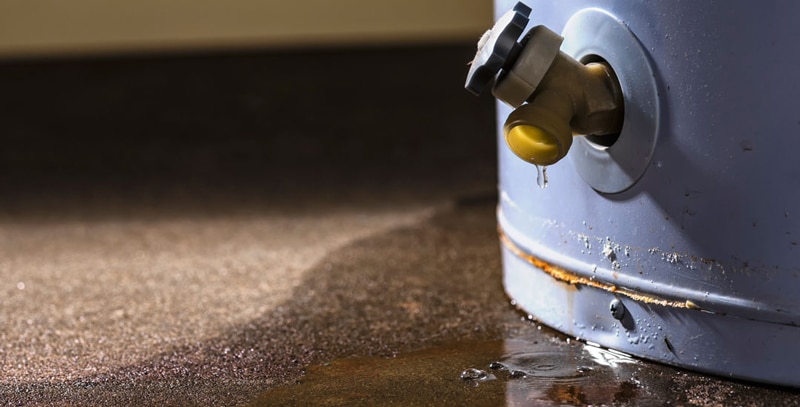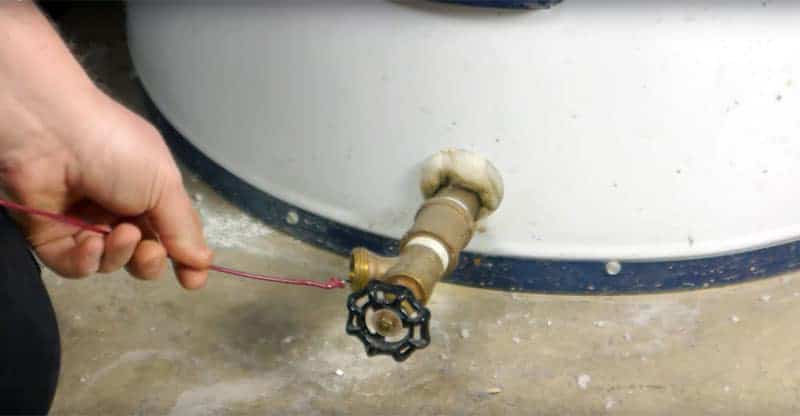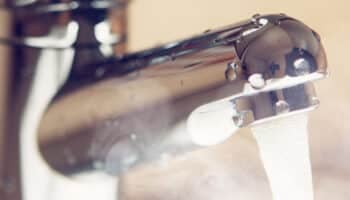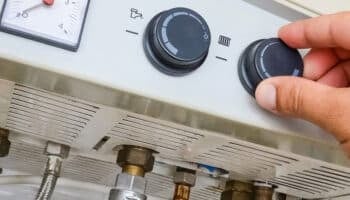We've independently reviewed this article to make sure it's as accurate as we can make it.
To find out more about our article creation and review process, check out our editorial guidelines.
You count on your home to have a steady supply of hot water.
So it can be super frustrating when you get stuck with cold water, or low water pressure.
There are several possible reasons why your hot water heater might not be filling up as it should. For example, there could be a leak somewhere in the hot water tank. Or, there could be an issue within the tank itself. If the tank’s water supply is continually filling and draining, this could be the issue.
Thankfully, it’s quite straightforward to work through the possible causes and fixes.
Together we’ll figure out what is working, what is not, and what you have to do to fix it. We have used all of our experience to put together a comprehensive guide, helping you figure out what is going on with your hot water heater and what you have to do to fix the problem.
Are you ready to get your hot water heater working again? If so, let’s jump in.
What You’ll Need To Fix Your Hot Water Heater
If you want to fix your hot water heater, you need to make sure you have all the equipment you need. Of course, you’ll need to have access to your water heater. You will also need to have access to your manual to figure out what the various parts are.
You may want to bring a flashlight with you so you can inspect the hot water heater closely. You should also bring a toolbox with you with some screwdrivers, some wrenches, and some pliers. This is important if you need to tighten anything or replace one of the parts. You may also need a garden hose if you need to empty the hot water heater.
4 Fixes To Address Your Hot Water Heater
There are four common fixes you should try if you want to get your hot water heater to fill up properly again. These include:
Step 1: Look for a Leak Somewhere
The first thing you need to do is look for a leak somewhere. For example, there may be an issue with the tank or one of the connected pipes. Look at the tank first. Check and see if there is excessive liquid around the base of the tank. You might even spot a few puddles.
If this is the case, there may be a leak somewhere in the bottom of the tank. There might also be a leak somewhere on the walls of the hot water heater. If your hot water heater is located in the corner of the basement somewhere, there could be an issue with the sidewall.
Remember to take a look at the pipes that connect to the hot water heater as well. They might have a leak that needs to be fixed.
If you can see the leak, you might be able to fix it on your own. Even though you may think that duct tape is going to be enough to fix this issue, it is probably not the case. Before you work on your hot water heater, make sure you shut off the water source. That way, you don’t have to worry about burning yourself or getting drenched in water when you try to fix the leak.
There’s a chance that something attached to one of the pipes simply has to be tightened. If that is the case, break out the toolbox, and see if you can get that part working properly. If you need to order a replacement part, you may want to reach out to a professional who can help you.

Step 2: Check for Some Trapped Air
Next, you may want to see if there is some air trapped in the hot water heater. If there is a pocket of air trapped within the pipes of your water heater system, the tank might not be able to fill properly. As a result, water is not flowing from your hot water heater to your pipes and faucets.
It is relatively easy to see if you have an airlock somewhere on the water heater. Travel to one of the faucets and turn on the hot water. Hot water requires more pressure, so this is the more likely scenario if you have trapped air.
If you notice the water is coming out cold or warm instead of hot, there’s probably an airlock located somewhere in the system. If the water flow is significantly reduced, or if you noticed that it is not consistent, you probably have an airlock somewhere in your hot water heater.
If you are interested in fixing the airlock on your own, this is not something that requires a lot of fancy equipment. First, check the hot and cold water valve on your water heater. Make sure they are turned on appropriately. Then, walk to a faucet somewhere in your house. Place the palm of your hand on the opening of the faucet. That way, water will not flow out of the faucet when you open it up.
After this, leave the hot water valve open. Completely open up the cold water. Make sure you have a tight grip on the faucet to prevent any water from coming out.
You will need to hold this position for a few seconds. Then, turn off the cold water and release your hand. Now, hot water should be running at the right temperature and pressure.
If this is not enough to address the airlock, you may want to reach out to a professional who can take a closer look. That way, you know the problem is going to be fixed appropriately.
Step 3: See if the Hot Water Keeps Draining and Filling
Another possible reason why your hot water heater is not filling up appropriately is that there is a continuous filling and draining cycle. As a result, the water is at the same level without actually getting full. If you hear water constantly going through your water heater tank, even when you are not using household appliances, then this is a sign there is an issue with the filling and draining mechanism.
Even though there are a few possible reasons why this issue might be developing, you should take a closer look at the TPR valve. It could be stuck in the open position. As a result, the water continues to drain out of the tank even when it is not in use.
This is something that frequently happens with older water heaters. You should be able to close the valve using everything in your toolbox. You may need a wrench to tighten something, but it should be enough to close the valve.
There is also a chance you might need to replace this valve entirely. If that is the case, take a closer look at the edge of the water heater. It may not be worth it to keep repairing an old water heater. It might be time to replace it.
Step 4: There Might Be a Clogged Pipe Somewhere
Finally, it is also possible that your hot water heater might have a clogged pipe somewhere. You should take a closer look at the tank, and see if there’s a clog that has to be removed. If you want to do this, you will need to empty the tank and take a closer look at the bottom.
If you see a bunch of sediment at the bottom of the tank, this is probably the issue. You will need to remove the sediment to fix the problem. Before you start working on your hot water heater, you need to turn off the power at the circuit breaker. If you have a gas water heater, you need to flip the thermostat to the pilot position.
Make sure to also switch off the water supply before continuing.
After this, take a garden hose and connect it to the drain valve. They should be at the bottom of the water heater tank.
Make sure you drain the water to a safe location that is not going to flood your home. Once you have done this, you can empty the water out of the hot water heater. You will need to clean the inside of the tank and take a look at the pipes connected to it.
You may need some special equipment to remove the clog from the pipe depending on where it is located. If you need help at this step, you should reach out to a professional who can assist you.

Do I Repair or Replace the Hot Water Heater?
You might be wondering if it is better to repair or replace the hot water heater. In general, if you have a new water heater, it is going to be worth it to repair the broken part. It might still be under warranty, which may save you even more money.
On the other hand, if you have an older water heater, it may be time to move on. You do not want to continue spending money repairing an old water heater that is at the end of its life. You may want to talk to a professional to figure out what type of water heater would be best for your needs, so it lasts for many years.
Get Your Hot Water Heater Working Again
These are a few basic steps you need to follow if you want to get your hot water heater working again. It can be frustrating when your hot water heater is not working as it should, and there are plenty of options available if you want to fix it.
At the same time, you also need to figure out if it is worth it to repair or replace your hot water heater. A professional might be able to help you go through your options and figure out what is best for your needs.







